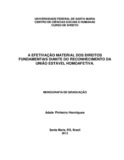| dc.contributor.advisor | Bopp, Maria Ester Toaldo | |
| dc.creator | Henriques, Adele Pinheiro | |
| dc.date.accessioned | 2017-08-21T16:47:21Z | |
| dc.date.available | 2017-08-21T16:47:21Z | |
| dc.date.issued | 2013-12-16 | |
| dc.date.submitted | 2013 | |
| dc.identifier.uri | http://repositorio.ufsm.br/handle/1/11421 | |
| dc.description | Trabalho de conclusão de curso (graduação) - Universidade Federal de Santa Maria, Centro de Ciências Sociais e Humanas, Curso de Direito, RS, 2013. | por |
| dc.description.abstract | The infraconstitutional legislation must comply with the principles and values brought by the Federal Constitution , which is the central pillar of the legal system of a State . Laws should not exclude any individual from the State protection , on the contrary, they must be applied so that they can focus on the largest possible number of factual situations in order to preserve the fundamental rights of citizens . The list of Article 226 , § 3 of the Federal Constitution of 1988 is illustrative and not exclusive of other formations that also require protection of the state to be recognized as a stable union. The interpretation of Article 1723 of the Civil Code in accordance with the aforementioned constitutional provision brought several benefits to homosexual couples in the sense that materially effected the fundamental right to freedom, equality and human dignity rights . With the inclusion of relationships between persons of the same sex in the concept of family , the conflict situations arising from these structures should be resolved within the family law , in which is predominant the principle of affection, not being relevant only issues of patrimonial order. The judgment of the Unconstitutionality Lawsuit Nº 4.,277 consisted of a judicial activism that led to the regulatory bodies of relatives who previously lived under the legal uncertainty due to lack of relevant legislation and the inertia of the Legislature. Thus, currently the homo-affective stable unions should receive the same legal treatment given to other stable unions , being applied to them all legislation dealing on this topic . | eng |
| dc.language | por | por |
| dc.publisher | Universidade Federal de Santa Maria | por |
| dc.rights | Acesso Aberto | por |
| dc.subject | Direitos fundamentais | por |
| dc.subject | Família | por |
| dc.subject | União estável homoafetiva | por |
| dc.subject | Fundamental rights | eng |
| dc.subject | Family | eng |
| dc.subject | Stable homo-affective union | eng |
| dc.title | A efetivação material dos direitos fundamentais diante do reconhecimento da união estável homoafetiva | por |
| dc.title.alternative | The material effective of fundamental rights face to the recognition of homo-affective stable union | eng |
| dc.type | Trabalho de Conclusão de Curso de Graduação | por |
| dc.degree.local | Santa Maria, RS, Brasil | por |
| dc.degree.graduation | Direito | por |
| dc.description.resumo | A legislação infraconstitucional deve obedecer aos princípios e valores trazidos pela Constituição Federal, que é o pilar central do ordenamento jurídico de um Estado. O rol do artigo 226, § 3º da Constituição Federal de 1988 é exemplificativo e não excludente de outras estruturas familiares que também necessitem de proteção estatal e que possam ser reconhecidas como união estável. A interpretação do artigo 1.723 do Código Civil de acordo com o dispositivo constitucional acima mencionado trouxe vários benefícios aos casais homossexuais na medida em que efetivou materialmente os direitos fundamentais à liberdade, igualdade e dignidade da pessoa humana. Com a inclusão dos relacionamentos entre pessoas do mesmo sexo no conceito de família as situações de conflito resultantes destas estruturas devem ser resolvidas no âmbito do direito de família, no qual predomina o princípio da afetividade, não sendo relevante somente as questões de ordem patrimonial. O julgamento da Ação Direta de Inconstitucionalidade de nº. 4.277 consistiu em um ativismo judicial que se tornou um marco teórico na seara do direito de família e que possibilitou a regulamentação de entidades familiares que anteriormente viviam sob a insegurança jurídica devido à falta de legislação pertinente e à inércia do Poder Legislativo. Dessa forma, para a realização do presente estudo foi utilizado o método de abordagem indutivo, bem como os métodos de procedimento documental, bibliográfico e histórico, a fim de verificar em que medida a decisão do STF contribuiu para tratamento jurídico igualitário dispensado às uniões estáveis homoafetivas. | por |
| dc.publisher.country | Brasil | por |
| dc.publisher.initials | UFSM | por |
| dc.subject.cnpq | CNPQ::CIENCIAS SOCIAIS APLICADAS::DIREITO | por |
| dc.publisher.unidade | Centro de Ciências Sociais e Humanas | por |


